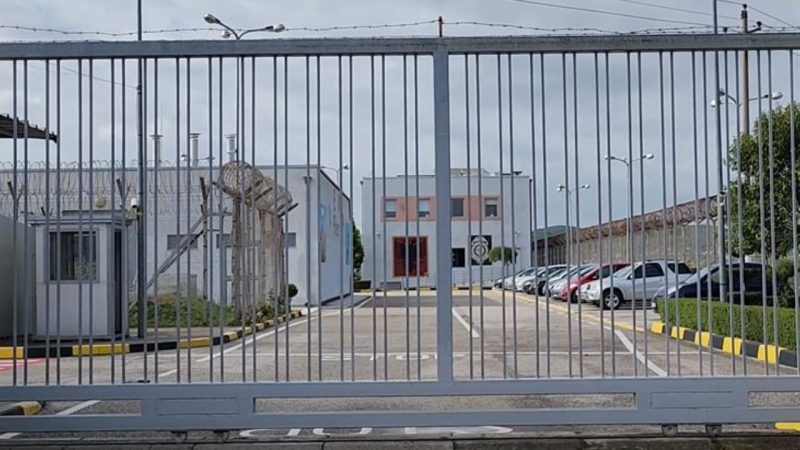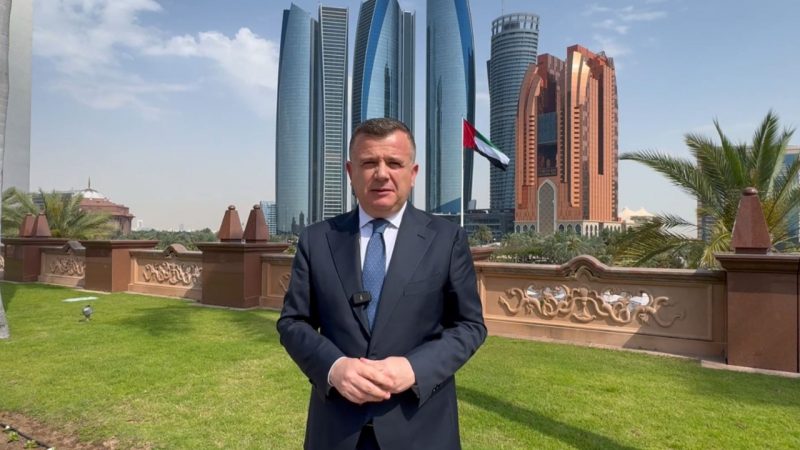 119 convicts are released from Fier prison today, others benefit from Criminal Amnesty in reduced sentences
119 convicts are released from Fier prison today, others benefit from Criminal Amnesty in reduced sentences
27/01/2020 16:58

Aiming at an inclusive advisory process, the President of the Republic of Albania. H.E Ilir Meta presented to the Venice Commission a list of questions requiring an opinion regarding the constitutionality of actions of each body involved in the process of reestablishing the Constitutional Court.
The questions were part of a comprehensive document (49 pages) with a true account of the process, based on official facts that prove the full dimension of unconstitutional actions followed by the Albanian Parliament, by the Chair of the Justice Appointment Council and other complicit institutions.
QUESTIONS OF THE PRESIDENT OF THE REPUBLIC FOR AN OPINION OF THE VENICE COMMISSION
Considering that the Venice Commission opinions are a reference source for all member states, and in need of reflecting on current state of affairs in Albania, I would like to put forward the following questions to clarify the model of a functioning democracy and the rule of law based on the principles of the European Convention of Human Rights.
I. EXPANSION OF THE SCOPE OF THE INVESTIGATION COMMISSION BY THE MONO-PARTY PARLIAMENT
In Opinion No. 959/2019 CDL-AD (2019) 019, the Venice Commission notes that:
“78. At the time of the preparation of this opinion, the Special Investigation Commission had been established, but had not yet provided its report, expressing the wish to take into account the opinion of the Venice Commission.”
1. Did the Albanian Parliamentary Investigation Commission take into consideration the Opinion and recommendations of the Venice Commission?
2. On expanding the scope of inquiry and prolonging the activity of the Parliamentary Investigation Commission for alleged violations of the law (and not the Constitution!), do you consider that:
– Does it serve to the reduce or increase of the tensions?
– Does it further serve or frustrate the goals of mutual checks and balances, in a situation where Parliament and all Municipalities are dominated by one party?
3. Does the expansion of the scope of investigation and prolongation of the activity of the Parliamentary Investigation Commission exceed the constitutional investigative power of Parliament?
4. In Opinion No. 959 / 2019 CDL-AD (2019)019, the Venice Commission notes that:
“80. While the composition of a constitutional court is always of keen interest for political actors, having in mind such a specific case when the judges are chosen is not an ideal background for ensuring their independence…”
4.1 In cases where Government and Parliament are one, and the President is the only institutional actor outside government’s tutorial: Does the expansion of the scope for alleged violation of the Law (and not the Constitution!) increase the imminent risk for political appointment of the members of Constitutional Court and of Supreme Court from only one party, i.e. from only one political actor?
4.2 Does this approach exceed parliamentary constitutional powers related to nomination of the judges of the Constitutional Court?
4.3 Does the illegal expansion of the scope of Parliamentary Investigation Commission place the President under political pressure to nominate to the Constitutional Court the candidates politically preferred by the ruling party?
4.4 Does it risk to jeopardize the legitimacy of the Constitutional Court?
4.5 Does the use of the Investigation Commission and of other actions of the mono-party Parliament risk to establish a precedent for improper political pressure by the ruling party even on the Supreme Court for the nomination of its 3 members of the Constitutional Court?
II. CONSTITUTIONAL COURT
The Constitutional Court stands at the top of Judicial Institutions in Albania.
In its interim Opinion No 824/2015 CDL-AD (2015)045, para 23 and 24, and the Final Opinion No. 824/2015 CDL-AD (2016)009, para 36, 37, 39, on the Revised Draft-Constitutional Amendments on the Judiciary, The Venice Commission warned of dangers when:
1. The Constitutional Court is established from the beginning;
2. The Majority has a qualified majority;
3. The President and Parliament belong to the same political force.
The Venice Commission demanded that clear rules be established for the gradual transition of the Members of the Constitutional Court, including the explicit designation of appointing institutions and modus operandi (constitutional sequence of appointment) so that the Court would not be politically captured by the ruling party.
1. In cases where parliament is de facto composed entirely by one political force, thus holds a qualified majority of 2/3 of Parliamentary votes, does election of the Constitutional Court members by only one party constitute a risk for political appointment of this Court?
2. Is the election of members of the Constitutional Court only by one political actor compatible with the European Constitutional practice and with Venice Commission recommendations in its opinion on Albania and Montenegro?
3. Does the establishment of the Constitutional Court only by one political force, thus by a single political actor, constitute a violation of Article 6 of the ECHR, as a Court established in violation of the Constitution and the Law?
4. Is the violation of modus operandi (constitutional sequence of appointments) while just commencing the implementation of constitutional and legal provisions, and while the Constitutional Court is established from the beginning, in line with European constitutional practice and does it risk setting a dangerous precedent for the future?
5. Is Parliament legitimized to interfere in the appointment procedure of Constitutional Court members designated to the President or the Supreme Court?
6. Can Parliament intervene in the relationship between the Justice Appointments Council (JAC) and other appointing bodies – i.e. the President or the Supreme Court, in circumstances where the constitutional power of Parliament is limited to electing only 3 of the 9 members of the Constitutional Court?
III. ON THE ACTIVITIES OF THE PRESIDENT OF THE REPUBLIC
1.When the Constitutional Court is established from the beginning, when parliamentary majority and the President do not belong to the same political party, and when the mono-party parliament seeks to hijack President’s constitutional power for appointing Constitutional Court judges, does the political majority risk to appoint more than 1/3 of the Constitutional Court members?
2. Does the violation of modus operandi (constitutional sequence of appointment) constitute a violation of the letter of the Constitution, of its spirit, as well as of the standard for a balanced composition of the Constitutional Court?
3. Between the constitutional provision to implement the modus operandi (constitutional sequence of appointment) and the legal provision to respecting the 30-day deadline; which provision prevails according the principle of hierarchy of norms according to the Constitution of the Republic of Albania?
4. Does violation of the modus operandi (constitutional sequence of appointment) constitute interference in the discretion space of the other appointing body?
5. According to European Constitutional practice, is it acceptable that misinterpretation of the unblocking mechanism deprives the President of his constitutional power to appoint a member of the Constitutional Court, notwithstanding he has continuously expressed and documented his willingness to exercise this power?
6. Does the distortion of the unblocking mechanism risk to establish a dangerous precedent by practically turning it into mechanism to hijack constitutional powers?
7. Does the failure to propose the minimum number of 3 different candidates for each vacancy by JAC, bring about a “forced” or a “predetermined appointment”?
8. Does this situation pose a high risk to annihilating the power to elect/choose in substance?
IV. ON THE ACTIVITY OF THE ALBANIAN PARLIAMENT
Venice Commission Opinion No CDL-AD (2016) 009, page 9, quotes: “In the European constitutional experience, the election by parliament of constitutional judges is often supported by the requirement of a qualified majority in view of ensuring a choice shared by a pluralistic support of political parties, and not by the majority only”.
In view of this assessment:
1. Does the election of the Constitutional Court members by a mono-party parliament contradict the spirit of Constitutional amendments, the above recommendation of the Venice Commission and the ultimately question the impartiality of the Court members?
2. When government, Parliament, all Municipalities, Municipal Councils and almost all independent institutions are in the hands of one party: does capture or paralysis of the Constitutional Court serve to the political interest of this force to be free of independent control mechanisms, such as the Constitutional Court?
3. When this mono-party parliament further seeks to appoint more than 1/3 of the members of the Constitutional Court by hijacking the appointment of the President, does Parliament exceed its constitutional power and establish dominance in the composition of the Court with candidates enjoying the support of only one political force?
4. Do Parliament’s refusal to cooperate with the President of the Republic , its voting in 11 November 2019 Plenary, and adoption of 15 December 2019 Resolution, evidence violation of the principle of constitutional loyalty with the purpose of capturing the Constitutional Court?
5. The legal initiative of Parliament, on 6 December 2019 , anticipating an amendment to the procedure of swearing in office to the President of the Republic, including introduction of the retroactive effect to remove the mandate of President’s appointed judge in the Constitutional Court, does it evidence that the mono-party Parliament is determined to capture the Constitutional Court at all costs?
6. Does Parliament’s activity to place itself in a position of supremacy towards the President (the Investigation Commission) and towards the Constitutional Court (Resolution 15.11.2019), along with its legal initiative on 6.12.2019, violate the principle of separation and balance of powers?
V. ON PARLIAMENT’S APPOINTMENTS IN THE CONSTITUTIONAL COURT
1. In the light of the European Constitutional practice, does the voting of a member of the Constitutional Court from a list with only one candidate legitimize the principle of “election”?
2. Why did the Constitution authors and the Venice Commission (2015-2016) envisage the necessity of at least 3 candidates for each vacancy? What risks were meant to be avoided? Is this risk eminent today? What do you recommend in such cases?
3. In this case, has the power of election been de facto dispossessed by a body that does not have such power, i.e. JAC ?
4. Does Parliament’s exclusion of Mrs. Arta Vorpsi from the list of candidates to be voted in its plenary of 11 November 2019, for the 2nd and 4th vacancies, constitute a violation of the Constitution?
5. How compatible is Parliament’s election of two judges in violation of constitutional procedure with the concept of a “Tribunal established by Law”, as defined by Article 6 of the ECHR?
6. Do Parliament’s constitutional violations related to election of its Constitutional Court members, taken alone and/or altogether, question the guarantees of individuals for a regular legal process?
VI. ON THE ACTIVITY OF THE JUSTICE APPOINTMENTS COUNCIL (JAC)
1. Does the duration in office well beyond constitutional mandate of the High Court Judge Ardian Dvorani (16 years out of 9 as stipulated by the Constitution), and consequently his assignment as JAC Chair, infringe the principles of independence and impartiality while exercising these duties?
2. Ardian Dvorani’s biased activity, in violation of the law and of the JAC decisions constituting in:
– The Constitutional violation of modus operandi (the sequence of appointments stipulated by the Constitution, and endorsed by JAC decisions on. 21.9.2019)
– Publishing in the Official Gazette the list of candidates for President’s second vacancy, in violation of laws no. 115/2016, 78/2014, and of JAC collegial decision;
– Official communication surpassing the scope of his mandate and in absence of a JAC decision;
– Failure to publish JAC meetings’ transcripts for a whole year, in violation of law no. 115/2016 (articles 226, 232) and the decision no 1, dated 08.02.2019 of JAC.
• Did it infringe the integrity of the election process for candidates of the Constitutional Court?
• Which constitutional provision foresees simultaneous appointments of Constitutional Court Judges from one designated institution?
3. All the facts related procedural violations of JAC establishment (blocking JAC functioning for 2 years; having only 7 members, and in the end only 5 out 9 required); do they affect JAC legitimacy and credibility, and consequently affect the legitimacy of its product, i.e. composition of candidates’ lists for the Constitutional Court?
4. The exclusion of the Ombudsman from JAC activity, in violation of the Constitution (article 179, point 11) and of the law no. 115 (article 233): does it infringe transparency of JAC activity and does it limit the constitutional powers of the Ombudsman?
5. How important is the plurality of candidates in the selection process of candidates, particularly when proceeding with several vacancies simultaneously, and when the Constitutional Court is established from the beginning?
6. If candidates for Constitutional Court are not part of the judiciary, and therefore vetted by JAC with the assistance of Government Agencies (Directorate of Classified Intelligence Information, Control Service for Internal Affairs in the Ministry of Interior, High Inspectorate of Declaration and Audit of Assets and Conflict of Interests, General Directorate for the Prevention of Money Laundering): Is there a risk of political favoritism towards candidates preferred by government?
7. Ranking the candidates who have failed the School of Magistrates test in the top of the lists, (violating law no. 84/2016, article 42, point 2, article 44, letter c, and law no. 96/2016, article 165, point 2, 3, 4, 8) does it infringe the credibility and integrity of the JAC assessment and ranking process? Consequently, does it infringe the credibility, level of professionalism and the integrity of the members of Constitutional Court, particularly when the latter is established from the beginning?
8. While the Albanian judicial system is currently examining:
i. a criminal case investigated by the Special Anti-Corruption and Organized Crime Structure (SPAK) on the arbitrary activities of the JAC Chair Ardian Dvorani; and
ii. an administrative case filed by the Ombudsman, opposing the by-laws approved by JAC:
What would be the effect of the Venice Commission Opinion towards the investigation and adjudication of these cases?
Honorable Mr. Buquicchio,
Given the persisting sui generis crisis in my country, and when thousands of Albanians are abandoning the country due to the non-functioning of the rule of law and violation of their fundamental freedoms, I would like to bring to your attention and to the attention of the Venice Commission that this Opinion shall have a direct impact on the course Albania is about to take, towards democracy or dictatorship!
With the assurance of the highest consideration,
Sincerely,
Ilir Meta
Top Channel
 119 convicts are released from Fier prison today, others benefit from Criminal Amnesty in reduced sentences
119 convicts are released from Fier prison today, others benefit from Criminal Amnesty in reduced sentences 24/04 15:47







